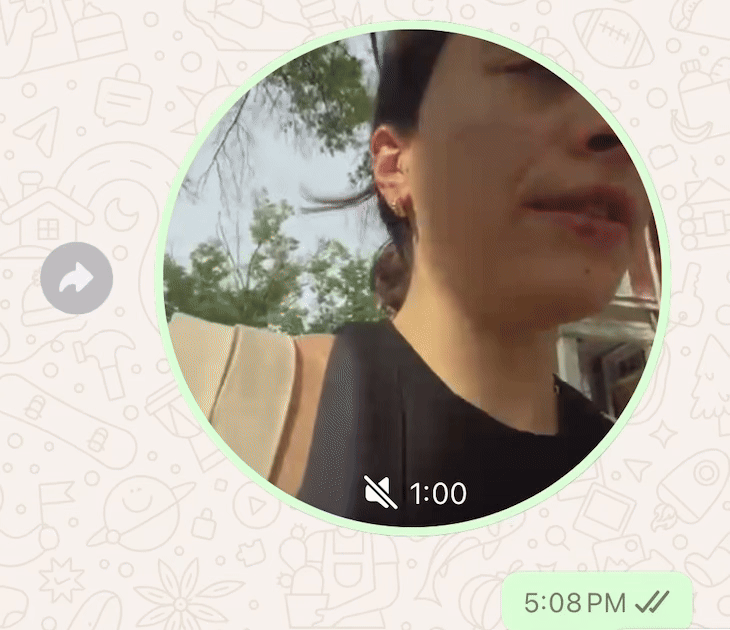3AM, my time, is when they arrive as small circular bubbles on my screen. One after another, a minute, or two apart. 9AM is when I see them. Before I tap on them, they autoplay on mute. I can see Nour’s face moving, her lips forming words I cannot hear. I watch her for a moment, caught in the silence, before I tap the circle and let her voice fill the space. She is in her car, the city behind her in motion, always complaining about the way people drive—wallah, these drivers are insane—swerving through traffic to avoid the morning rush. When I reply, I am on my morning walk, grumbling about Mocha taking her precious time sniffing the same patch of grass she always, eventually, pees on. Our conversations flow in cycles, a routine dictated by distance, habit, and the constraints of the technology that delivers them.
The format of WhatsAapp video messages shapes the way we communicate. Each message cuts off precisely at one minute, regardless of where I am in my sentence, regardless of whether my thought is complete. I don’t always notice when it happens. To continue, I have to go back, listen to myself speak, and find the exact moment when my voice was abruptly silenced. There is no way to scroll through or skim my own recording, no option to play it at a different speed. I must sit through it, fully present, in order to pick up where I left off. The one-minute limit forces brevity, but also demands presence. There is no editing, no second take, just raw and unfiltered responses. I stumble over words, backtrack, leave sentences half-finished.
And so, we adapt. We’ve developed a tic, a verbal crutch to bridge the gaps: every new video note begins with also—, as if the thought was never interrupted, as if the technology hadn’t intervened at all. Also, as I was saying… Also, I forgot to mention… it’s a filler word masquerading as continuity, a way to pretend that our conversations aren’t fragments stitched together.
Technical limitations also shape our conversations: Sometimes, the video and audio lag, distorting my voice so that it arrives detached from the movement of my lips. My expressions seem mismatched, as if my words belong to a different moment than the one I am witnessing. I re-watched a video message I sent a few days ago. For the first few seconds, I see my lips moving, but all I hear is silence. I tap on the screen, thinking that it’s still on mute. It’s not. About 5 seconds in, the silence breaks.
And then there are moments when words do not feel enough, or feel too much. When I hesitate before pressing send, questioning whether something should be spoken at all. There are emotions that a one-minute video cannot contain, pauses that do not translate, silences that say more than speech. Sometimes she says something that makes me laugh, really laugh. But by the time I've watched all her messages and it’s my turn to respond, the moment has passed. I try to tell her, you made me laugh so much when you said that, but it feels forced, insincere, like a reattachment of something that has been lost. Other times, she interrupts herself mid-sentence—Actually, I’m gonna leave this for a call, I don’t want to keep getting cut off by the minute mark. We always say that. Let's get on a call soon. But we never do.
There was a time when our conversations didn’t have this delay—when we shared time in the same way we shared meals: simultaneously, in person. We lived on the same schedule, breathed in the same air, laughed at the same joke at the same time.
We share a language, but not all of it survives the journey. We mostly speak in English, with a few Arabic exceptions—ya’ani between clauses, wallah for emphasis, yalla when we’re impatient. We use these words as little reminders of a shared history that English alone can’t carry. Once, we tried to have an entire conversation in Arabic, just to see what could happen, but it was a disaster. We fumbled over syntax, paused too long to search for words, and laughed at how stiff we sounded. Two days later, we were back to English, relieved. It wasn't that we’d forgotten Arabic. It was that English had become the language of us, the language of updates, of jokes and confessions, of video notes sent hours apart. Arabic was the language of family and of formalities. To speak it to each other felt like wearing someone else’s clothes.
Sometimes, the silence between messages stretches longer than usual. A day, then two. Technology gives us the illusion of continuity, but friendship has always been asynchronous. Once, letters took weeks to cross oceans; now, video messages float in the cloud, waiting for the right moment to be heard. We are time travelers, speaking across hours, never quite in sync.
There are moments when I misinterpret her tone. Maybe it’s the lag, or the way video compresses expressions. A pause that would be natural in real time suddenly feels weighted, like a hesitation. A clipped response sounds colder than she meant it to. I wonder if she ever misreads me too—if a joke falls flat because my laugh doesn’t carry the way it would in person, if my silences feel longer than they were. We’ve never addressed it. We just keep talking, trusting the gaps will fill themselves in.
And maybe they do. Or maybe we’ve just learned to live with them—mishearings, pauses, missent texts—all folded into the rhythm of how we speak now. Like the occasional also dropped into a sentence where it doesn't quite belong, we let it slide, knowing what the other meant anyway.
And yet, despite the distance, despite the distortions, there are times when her voice reaches me at exactly the right moment. A message arrives in the middle of my morning walk, and I let it play on my Airpods. Or I wake up to find a video waiting, a thread of continuity between yesterday and today.
We used to share time in the same way we shared meals—simultaneously, in person. Now, time zones dictate our rhythms. My mornings are her afternoons; her exhaustion is my energy. I watch her complain about traffic while I’m halfway through my walk, the sun already higher in her sky than mine.
Aya Khalife is a Lebanese multidisciplinary designer, a daughter and a friend who thinks a lot about memory, distance, sound, silence, and everything in between.












